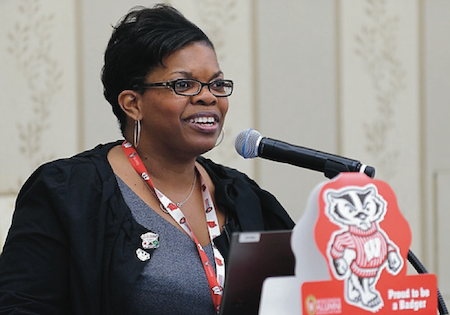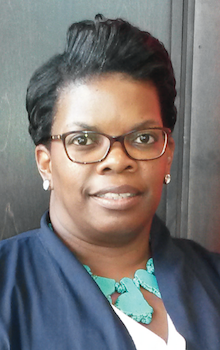July 10, 2015

Adele Brumfield speaks to prospective students and their parents during an event sponsored by the Office of Undergraduate Admissions in Santa Monica, CA. Photo credit: UW-Madison, University Communications.
“I was a kid who was bussed and had no money to go to college, and now I’m out here representing the United States. That’s why I stay in this work, because education is powerful, but you have to believe it,” she said.
This week Adele C. Brumfield celebrated her 5th year anniversary as Director of Undergraduate Admissions and Recruitment at UW-Madison.
Reflecting on her tenure at UW so far, Brumfield said, “Being a daughter of the state and having always known about UW-Madison and the impact that this university has across the world, being in the position to lead the admissions office – it’s a wonderful, wonderful thing. It’s powerful.”
Passionate about her position today, Brumfield wasn’t always on the path to become involved in university admissions.
Born and raised in Milwaukee, WI, she attended Shorewood High School and began her undergraduate career at Marquette University as a first-generation college student. Originally, Brumfield said, “My intention was to be in the news and in the media,” and she worked for the school newspaper and TV station while obtaining her degree in Broadcast Communication.
She found her first job experience in admissions at Marquette through a job lead from the school’s Educational Opportunity Program, a program that helped first-generation and low-income students. There, she worked on multicultural recruitment and publications, but stayed only for a year. “It wasn’t my career path, it wasn’t my destiny… At least I thought it wasn’t,” she recalled.
Still determined to pursue a career in media and communication and following a brief stint in Maryland, Brumfield moved to Michigan to begin her graduate career in Telecommunication Studies at Michigan State University.
After she graduated, jobs in communication – particularly jobs that paid a living wage –were scarce. Feeling that she needed to redirect her focus in order to be gainfully employed, she remembered her previous position in admissions.
“I thought, ‘I think I’ll give that a go.’ There were things that I really liked about it – an opportunity to travel, to work with students, and to use my communication skills,” said Brumfield.
She was hired in admissions at Denison University and later at University of Chicago, where she focused on undergraduate multicultural and student of color recruitment. Initially during her years at Denison and University of Chicago, she still saw admissions as a stepping-stone to something else, but all the while continued to build skills in new areas and take on new responsibilities.
At Denison, Brumfield became Publications Liaison, and at University of Chicago she began to manage operations, such as handling a multi-million dollar budget and introducing a new system of document imaging to the school.
She noticed how the transient nature of working in admissions allowed colleagues of hers who stayed in the profession to advance, particularly men, despite the field being dominated by women. “So when I saw these guys moving up, I thought, ‘wait a minute, something’s not right.’”
Brumfield had to decide whether to commit to the profession or move on to something else. “In committing, I had to figure out what other skills I needed to learn and master in order to move up into a position like what I’m doing right now,” she said.

Photo by Brianna Rae
She knew that it was easy to get pigeonholed in an area of expertise – for example, multicultural and people of color recruitment – and to not be able to advance beyond that. Though she appreciates the dedication that some have to a certain cause or area of expertise, Brumfield also believes that there is power in moving up: “The way you can really have influence is if you’re at the table and you’re a policy maker, or one who’s really directing the strategy.”
Her Work At UW-Madison
As Director of Undergraduate Admissions and Recruitment, Brumfield is responsible for, in the most basic sense, identifying future Badgers.
“The work is finding students and piquing their interest in the opportunities that exist here. We work with school counselors and people who are influencers to young people; we go to college fairs and high schools, and we entertain an enormous number of guests here at UW,” Brumfield said.
Just last year, they had nearly 48,000 individuals attend on-campus admissions events.
“Our office has always been aggressive as recruiters, we do not rest on our laurels as a flagship. We really think deeply about the next generation and how to make sure that they come here,” Brumfield said.
But the challenge doesn’t end at recruitment. Last year, Brumfield’s office received a record 33,000 applications for freshman, and nearly 7,000 for transfer students.
In addition to the sheer volume that Wisconsin’s flagship, world-class university attracts, UW-Madison is unique in that it evaluates applicants using a holistic admissions strategy. Holistic admissions takes into account the whole individual – their background, academic achievement, interests, involvement in extracurricular activities, and ability to articulate how they can contribute to their community – instead of solely basing admission off of test scores.
Working with a full-time team of about 55 people, and over twice that number when limited-term employees, seasonal workers, student workers, and interns are taken into account, Brumfield and her staff work tirelessly to ensure that the best, most well-rounded students are accepted as Badgers.
“I’m really blessed that we have developed a great team of people who are committed to UW-Madison and who know that this should be the destination for young people throughout the nation and throughout the world,” Brumfield said.
Efforts to Increase Diversity
Brumfield is concerned about access to the university, and sees efforts at increasing diversity as a priority.
“I worry that we’re leaving too many children behind. When you look at the achievement gaps, when you look at young girls and boys of color, something’s not working,” she said.
Brumfield, based on her own personal experience and influenced by the encouragement of her mother to pursue education, sees education as a means to open doors and create opportunity. “I worry sometimes about kids not knowing how to dream big, that maybe they don’t understand the value of an education or there aren’t enough people who are guiding them,” she said.
She draws insight and perspective from a recent experience she had where she served as an education ambassador through the U.S. Department of State’s Overseas School Program. Through the program, she had the opportunity to travel to the Middle East to speak about the value of U.S. higher education:
“I really think about, how did I end up here as a first-generation kid from what people now call the hood of Milwaukee? I was a kid who was bussed and had no money to go to college, and now I’m out here representing the United States. That’s why I stay in this work, because education is powerful, but you have to believe it,” she said.
Brumfield’s highly trained staff, her recruitment strategies and her partnerships with other organizations both locally and nationally speak to her commitment to make the university accessible to everyone.
“When I think about our recruitment efforts for students of color, one of the things that prevents us from realizing full success is that the financial aid and scholarship money is very limited. I would like to see that improve and I think it will. Chancellor Blank has identified the need for increased financial aid to make UW-Madison more successful, and this is a priority,” said Brumfield.
In addition to supporting increases to financial aid, Brumfield’s staff focuses on how to help students, particularly first-generation and students of color, see themselves as someone who would and should attend UW-Madison.
“I think for kids who are going to college for the first time – like for me, I was a first-generation college student – if you don’t know what the pathway should be, it’s very distant and sometimes hard to see yourself in places. We want to create pictures for kids to say, ‘That could be me, walking down State Street,’” said Brumfield.
Another one of her recruitment strategies is to target parts of the country with higher diversity.
“We always take care of home first. We think about what more we can do in Green Bay, Milwaukee, Racine, Kenosha or Beloit.”
But, she adds, “We do a lot of work in Chicago. We partner with a group there called Chicago Scholars, and we’re getting more of those students to enroll, many of whom are first-generation or students of color. Nationally, we partner with an organization called the POSSE Foundation, which works with students from Chicago, Los Angeles, Washington, D.C., and New York City,” said Brumfield.
The university’s commitment and efforts to increase diversity are strong, and their success can be seen in numbers. Since 2005, minority presence on campus has risen by nearly 40%, from 3,223 students in 2005 to 4,543 students in 2014, and is continuing to increase.
“One thing I want for all students who come here is that with our resources and our faculty, that they thrive and excel,” Brumfield said.
Their accomplishments thus far are only the beginning. Brumfield and her team are always looking ahead and strategizing for continued success in the future.
“We’re striving to be the best admissions office in the 21st century and we’re trying to imagine what that means for another 5-10 years and plan accordingly,” she said. “UW-Madison is a place with endless potential, and to be a part of that is very exciting,” she added with a smile.

